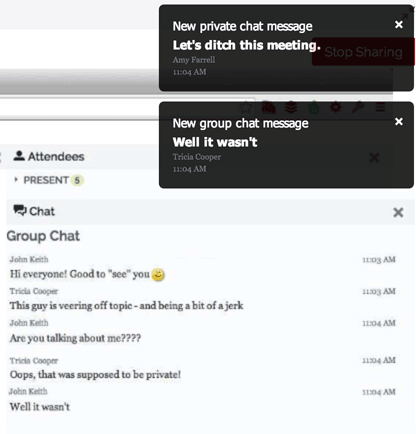3 Reasons to Rethink Private Meeting Notes
I started experimenting with profanity at age 10, and my mother told me “Whenever you use one of those words, I want you to picture that thing you just said physically dropping out of your mouth onto your shoes.“
This effectively unpleasant image kept my language squeaky clean for about 2 years, and has helped me keep in mind this basic rule: If you don’t have something nice to say, don’t say anything at all.
As an adult, I can admit that I apply this rule inconsistently. Not everything I say is nice, because the world just isn’t always a nice place. I do, however, apply the rule rigorously when it comes to written communication, especially anything that pertains to the business and our clients.
At Lucid Meetings, the rule is non-negotiable; we do not tolerate disparaging remarks about teammates or clients. It’s bad form, creates bad energy, and there are just way too many ways it can come back to bite you.
With that in mind, I can tell you that we sometimes get requests to add a “private” note feature to Lucid Meetings, and we debate.
Private meeting notes might be useful
Some people take personal notes during meetings, just like they took lecture notes in college. They catch key points, add reminders to self and use note taking as a stimulus to help them stay engaged/awake. Decent reasons for private notes, although none that can’t be just as easily accomplished with a piece of paper.
We do support private chat, because it’s just good manners to send a private note when you need help with a phone number and don’t want to distract the group. But with that said…
Private meeting notes might go horribly, horribly wrong
Then there are the other kind of private notes. The ones marked private because they’re not for sharing. Snarky observations about the presenter. Exasperation with a “crazy client”. Back-channel machinations on how to stop, prevent, spin, lead, ditch or otherwise deal with someone in the room. Those kinds of remarks that would leave a stain on your socks.
If you find yourself tempted to talk smack about your clients or coworkers in “private” notes, please stop.
These kinds of back-channel communications feed a negativity that’s incompatible with successful collaboration, and frankly it makes you look about as professional as a 13-year old.
For some of you, though, this kind of banter is just a part of your culture. I get that there’s a culture out there that’s built an identity around “clever” snarky behavior, and I don’t for a minute buy the idea that this is isolated to male-dominated workplaces. If you’re even tangentially part of that crew, then the idea that your quip could be “hurting the collaborative vibe” probably isn’t very compelling.
With that in mind, here are three other reasons to keep that witticism to yourself when taking notes.
1. Screen sharing can show everyone your private note
Maybe you know to turn off all your IM clients before you share your screen. Maybe you never, ever, ever have to share your screen on the spot.
Maybe, but not likely. Even the best presenters sometimes forget to close all those extra windows and alerts before broadcasting, and when they do, messages meant for their eyes only are now instantly shared with everyone in the meeting. Urgh.

And, even if you are really good about never letting the snark on your screen leak, what about the person to whom you’re snarking? Are they also a screen sharing circus master, able to juggle off-color banter and professional presentation with the greatest of ease? Better not count on it.
An aside: I tried to find screenshots of awkward things popping up during screen sharing, and couldn’t find a thing. I can only assume that when a presenter is mortified, they don’t stop to take a screen shot of their shame then post it for others to enjoy. So we had to make our own “bad chat” example. If you find one a good one, please share on twitter and I’ll update the post!
2. E-discovery means lawyers can use your private note in court
E-discovery is a legal process where lawyers go through all the information on your computer, your project management records, your email and so on to find evidence that can be used in court.
If you or your company faces litigation, it’s illegal to knowingly destroy any potentially damning messages, as that’s basically the electronic form of “shredding the evidence”.
And as far as the law is concerned, marking something “private” is irrelevant. Even personal social media accounts are subject to legal review and can be used in court.
There is only one safe course for meeting notes when it comes to your reputation, liability, and the law; Don’t put anything in writing that you wouldn’t be comfortable defending in public.
3. Accidents and revenge mean private in writing might as well be public
Politics gives us more examples than we can count of “private” affairs becoming public and career ruining. Recently, the news has been awash with tales of the tech elite getting caught traipsing mud across the floors, so to speak.
So if it isn’t screamingly obvious, let me put it plainly: anything you write down can be mistakenly delivered or rebroadcast out of context.
Any time you think you’re just going to type that potentially embarrassing note, email, or tweet privately, just don’t. Sometimes the technology gets it wrong, and it’s really easy to just screw it up and click the wrong button. Should it serve their interest, it’s trivial for the person on the other end to make your private conversation public.
TL;DR version: follow Wheaton’s Law
For those who skim, here’s the summary. When you chat or take notes during a meeting, don’t be a dick. It can save you embarrassment, legal woes, and it’s just the right thing to do.



